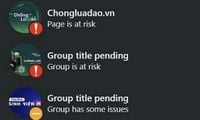In recent days leading up to June 25, 2025, Facebook users worldwide have been grappling with a bewildering and disruptive technical glitch that caused the mass suspension and deletion of thousands of Facebook groups. This widespread issue, affecting communities from Vietnam to the United States and Europe, has left administrators and members alike scrambling for answers as their groups—some boasting memberships in the millions—were suddenly locked, renamed, or completely wiped out without clear explanation.
Meta, the parent company of Facebook, has acknowledged the problem, confirming that a technical error impacted several groups. Meta spokesperson Andy Stone told TechCrunch, “We have noted a technical error affecting some Facebook groups. Currently, we are working on a fix.” However, the company has so far refrained from providing detailed information about the root cause of the incident, leaving users and experts to speculate on the underlying issues.
The timing and scale of the disruption have been particularly alarming. On the afternoon of June 24, 2025, many Facebook groups in Vietnam abruptly received notifications stating, “We have suspended your group.” This message was not isolated to any specific category but spanned a wide range of interests, including buying and selling, entertainment, technology, parenting, pet care, gaming, and more. Some groups were even renamed to “Group title pending,” signaling a system-wide freeze on their activities.
Users attempting to access these groups found themselves greeted with messages like “This group is temporarily paused,” unable to post content, share images, or communicate within the communities they helped build. The impact extended beyond groups themselves; personal accounts of many administrators faced feature restrictions, such as being barred from messaging, and fanpages linked to these groups were also locked, compounding the disruption.
The consequences have been far-reaching. For many, Facebook groups are more than just social spaces—they are vital hubs for community support, hobbyist engagement, and even business transactions. Individuals and small businesses that rely on these groups for online sales and customer interaction reported significant losses and operational challenges during the outage. The sudden suspension of groups with hundreds of thousands, or even millions, of members disrupted connections and commerce alike.
Adding to the confusion, numerous administrators received automated notifications accusing their groups of violating Facebook’s policies, citing reasons such as “related to terrorism” or “pornographic content.” These claims appeared wildly inaccurate, especially when applied to groups dedicated to harmless topics like bird photography, money-saving tips, pet care, Pokémon gaming, mechanical keyboards, and interior design. One particularly large group with nearly a million members, solely sharing animal photos, was flagged for “sensitive content,” an allegation that struck many as absurd.
Among those affected, some administrators subscribed to Meta Verified, a paid service offering priority customer support. These users reported receiving assistance from Meta’s technical teams and having their groups restored relatively quickly. However, many others remain in limbo, waiting for responses and advised not to rush into appeals, as the problem appears to stem from a systemic technical error that might resolve itself once fixed.
The Facebook admin community has been actively sharing information and coping strategies on platforms like Reddit, where discussions have become a lifeline for those seeking to understand and navigate the crisis. Some administrators reported all the groups they manage were simultaneously deleted despite strictly adhering to Facebook’s rules and regularly moderating “sensitive” content.
This is not the first time Facebook has faced such accusations. In 2022, a similar wave of mass account lockouts occurred, which Meta later attributed to a technical glitch. Over the years, users have repeatedly reported sudden, unexplained suspensions of fanpages and groups, often restored only after appeals, though Meta seldom disclosed reasons for these actions.
Technology experts have weighed in on the possible causes of this latest incident. While Meta has not specified the underlying issue, some specialists suggest that Facebook’s increasing reliance on artificial intelligence (AI) for automated content moderation may be a contributing factor. As AI systems become more integral to managing the vast volume of content on social media platforms, the risk of erroneous flags and overreach grows.
Such concerns are not unique to Facebook. Earlier in June 2025, other social networks like Pinterest and Tumblr also faced backlash due to mass suspensions of accounts. Pinterest attributed its troubles to an “internal error,” while Tumblr pointed to testing a new content filtering system unrelated to AI. These incidents highlight the broader challenges social media companies face in balancing automated moderation with user rights and transparency.
The current Facebook outage has sparked a wave of petitions on various platforms, gathering over 12,000 signatures demanding that Meta explain the incident and restore affected groups. Some impacted businesses are considering legal action due to the significant disruption to their operations.
As of June 25, 2025, Facebook groups are gradually being restored and becoming functional again, though many group names still appear as “Group title pending,” indicating that full recovery is still underway. Meta continues to work on resolving the issue but has yet to provide a comprehensive explanation or timeline for complete restoration.
This episode underscores the fragility and complexity of digital communities in an era dominated by automated moderation and AI-driven decisions. It raises pressing questions about the transparency, accountability, and reliability of these systems that govern so much of our online social lives and economies. For now, Facebook’s global user base waits anxiously for clarity and assurance that such disruptions will not become the new normal.


